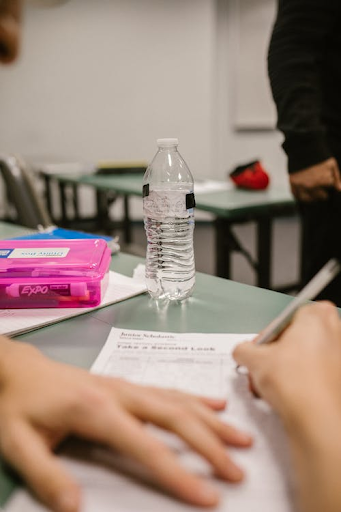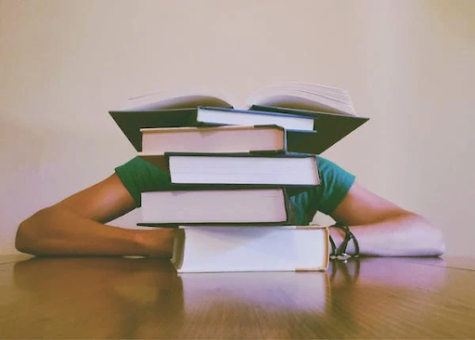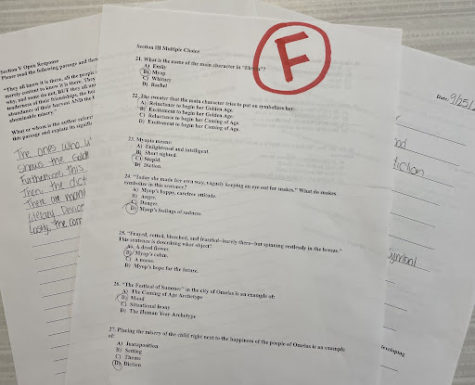Are Retakes Fair?

Photo source: PEXELS
October 5, 2022
Retaking quizzes and tests is a controversial topic between students and teachers at Pentucket Regional High School. Are retakes fair? Are students learning from their mistakes? Is it important for students to fail? When it comes to retaking quizzes and tests, it varies between teachers. Some teachers believe that students should get a second chance while other teachers believe that it is important for students to fail from time to time.
Students vs. Teachers
When interviewing different students and teachers, most students agreed that retakes should be available after quizzes and tests.
“Everyone deserves second chances,” says sophomore Sydney Trout, “however, I think it also depends on the context. If they give you the amount of time needed to ace it, I don’t think there is any reason for a student to retake it”.
Trout raises the idea that all students should be able to perform well if given the right amount of time. However, is it fair to let the teachers determine how much time a student needs to study and understand the information?
Trout responded, “I think that the student should communicate with the teacher and maybe find ways where they can easily obtain the information without struggling”.
On the other hand, Mr. Lovett, health sciences teacher at Pentucket Regional High School and Merrimack College, says, “My concern is that students think they don’t need to study because they could always take it again”.
If students take advantage of a teacher that is offering retakes, that student will typically not study for the first quiz and “wing it” knowing if they do poorly, they will have a backup plan. Do all students take advantage of second chances?
Understanding the Material
If a student does better on a retake, shouldn’t they be able to achieve the same score the first time around?
When asked this question, senior Seamus Burke responded, “Sometimes it’s the quality of the studying. If you study differently the second time it can help you understand the material”.
Oftentimes, learning how to study is left up to the student. Trial and error is the only way to learn how to study, study habits that don’t work the first time won’t work the second time. Retaking a quiz or test not only shows better comprehension of the material but also helps students figure out which studying technique works best for them. This is crucial, especially in early high school years.
While Sydney Trout responded, “I think if you keep getting second tries, it defeats the purpose of studying really hard”.
Although learning how to study is important, how many times does a student need to learn how to study the right way? Like Sydney said, if a student keeps getting second chances, it doesn’t teach the student to work hard the first time. It only teaches the student that they will always have a second chance.
Student Stress
Do you feel less stressed for a quiz if you know you can retake it? When asked this question, 100% of students interviewed answered “yes”.
Sophomore Sydney Trout said “It’s kind of like video games, if you know you have another heart left, it makes it more comforting to know that you have a second chance”.
What Trout means is if a student knows they have a second chance to retake a quiz or test, they are going to feel better and not be as nervous or stressed going into the first one. Low stress is important, especially early on in life. High levels of stress can lead to anxiety and depression, which is not ideal for the growing brain. Students in this generation have enough stress as it is, do schools need to add to that?
Sophomore Vivian Rizzo responded and said, “I think a small amount of stress is necessary for growth, overwhelming stress is unhealthy but a small amount is an indicator that the students cares about what they are doing”. Small amounts of stress in school can be a sign that students care about their grades and their success in school.

Limit on scores?
Across many subjects, teachers believe students should not be able to earn full credit on their retake. Mr. Lovett says, “I usually average the two, but if they’ve shown significant growth I will usually lean towards the higher score.”
On the other hand, senior Seamus Burke says, “If they have 100% understanding then they should be able to achieve 100%”. However, this raises the question, is it fair to the students who studied the first time and did not do the retake?
Fairness in the Retake
Brendan Lincoln, a Pentucket Alumni, responded to the prior question and said, “I think that at a baseline it is not fair to the students who put in a lot of effort studying and are successful on their quizzes, tests, and exams, while there are some students who rarely study and put in minimal effort, but are allowed a retake when they do bad”.
Retaking tests and quizzes does not teach students to work hard for their grade, it teaches them that they will always have a second chance in life, which is not the truth. However, Brendan brings up the point that there are other reasons for students putting in minimal effort.
“You have some students that are working six or seven hour shifts after school, or some students that have to take care of their family because their parents are at work”.
Students that do not have time in their day to put in maximum effort are stuck. Do they support their family or just themselves? At the end of the day, schools do not know what a student is going through outside of school which may lead that student to not study as “hard” as other students. Either way, failure or disappointment may arise.
Is Failure Important?
Although there has been new interest about children failing or succeeding in school, some believe that failure is important, especially as the young brain is growing and developing. Failure can teach tolerance to a student and help them succeed the next time. However, if a student does not learn to fail, it can cause collateral damage on their mindset. Students that do not learn to fail also fail to build resilience and give up easily. However, if a student fails a quiz or test, next time that student may choose to study harder and get a better grade.

When asked “Is failure important for students to learn” Vivian Rizzo replied, “It is important for students to learn to fail, failing builds a tolerance to imperfection and shortcomings that we will inevitably encounter throughout our lives. Without the confidence to fail, you do not have the confidence to try, hindering opportunity”.
If a student does not learn to fail, they will not learn to try or try again.

Zoe Davis • Nov 6, 2022 at 6:31 pm
I think it was a great choice to use responses from both students and teachers because retaking a test can have different meanings based on others’ positions. I think it was important bringing up the point of fairness in the retake to show acknowledgment to others in the debate of a retake. You did a nice job of representing both sides of the argument.